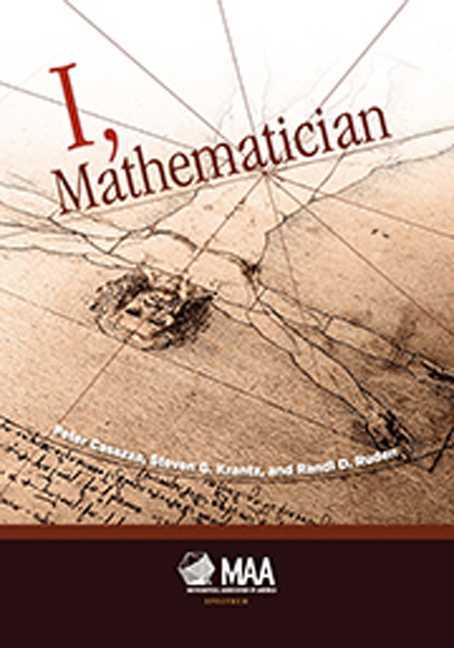Book contents
- Frontmatter
- Contents
- Preface
- Part 1 Who Are Mathematicians?
- Part II On Becoming a Mathematician
- Foreword to On Becoming a Mathematician
- 11 Mathematics and Teaching
- 12 Who We Are and How We Got That Way?
- 13 Social Class and Mathematical Values in the USA
- 14 The Badly Taught High School Calculus Lesson and the Mathematical Journey It Led Me To
- 15 The Psychology of Being a Mathematician
- 16 Dynamics of Mathematical Groups
- 17 Mathematics, Art, Civilization
- 18 Questions about Mathematics
- 19 A Woman Mathematician's Journey
- Part III Why I Became a Mathematician
17 - Mathematics, Art, Civilization
from Part II - On Becoming a Mathematician
- Frontmatter
- Contents
- Preface
- Part 1 Who Are Mathematicians?
- Part II On Becoming a Mathematician
- Foreword to On Becoming a Mathematician
- 11 Mathematics and Teaching
- 12 Who We Are and How We Got That Way?
- 13 Social Class and Mathematical Values in the USA
- 14 The Badly Taught High School Calculus Lesson and the Mathematical Journey It Led Me To
- 15 The Psychology of Being a Mathematician
- 16 Dynamics of Mathematical Groups
- 17 Mathematics, Art, Civilization
- 18 Questions about Mathematics
- 19 A Woman Mathematician's Journey
- Part III Why I Became a Mathematician
Summary
To the memory of Friedrich Hirzebruch.
Imagine Paris in the 1920s, the capital of modernism and high fashion. Reminiscing about those times, Coco Chanel told Paul Morand about Picasso:
It was his painting I admired, although I did not understand it. I found it convincing, and this is what I like. For me, it's a logarithm table.
Think about this remarkable parallel. Mathematics is abstract, and the art of Picasso is abstract. It would seem that this is the most evident resemblance between the two imponderables: “Harlequin with Violin (‘Si tu veux’)” (1918) and a Table of Logarithms. Chanel, however, chooses a different word: both are convincing, and that is what attracted her.
***
In this essay, which is devoted to various aspects of mathematics as a long-term human activity, I want to pay special attention to this quality of being “convincing.”
On a personal level, whether or not a proof, an idea, or a computer simulation is convincing depends on the mathematician's predisposition toward geometrical or logical reasoning, philosophy (conscious or subconscious), and a system of values.
On a social plane, large-scale historical circumstances come into play; they can cause either an amazing flourishing of mathematics, or its virtual extinction.
For obvious reasons, historians of mathematics study the places and times where mathematics was created or at least accepted as a legacy of other times and/or societies. But it would be very interesting to take a good look at the historical circumstances when mathematics was neglected or even (temporarily) disappeared.
The development of ancient (mainly Greek) mathematics in Europe was halted for at least the first thousand years of Christianity. Still earlier, before the advent of Christianity, when the practical and militaristic Romans created their higher culture, they incorporated the Greek humanities but not Greek science. Even the obvious military applications did not tempt them. According to Plutarch, at the siege of Syracuse the Roman general Marcellus vainly urged his soldiers not to retreat:
What! Must we give up fighting with this geometrical Briareus, who plays pitch and toss with our ships, and, with multitude of darts which he showers at a single moment upon us, really outdoes the hundred-handed giants of mythology?
- Type
- Chapter
- Information
- I, Mathematician , pp. 203 - 216Publisher: Mathematical Association of AmericaPrint publication year: 2015



